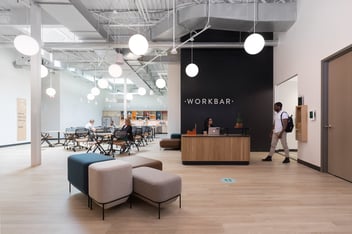How Do I Convince My Employer to Pay for my Coworking Membership? (& Why It’s a Smart Business Move)

The shift to flexible work is no longer a trend, it’s the new standard. And as companies adapt, coworking has gone from niche to necessary. At Workbar, we’ve known this since 2009. Now, even Fortune 500 companies are getting on board, because coworking offers something no other model can: the structure of an office, without the lease, the commute, or the chaos of working from home.
If you're finding that your productivity dips in your kitchen-turned-office or you're one more barking dog away from losing your mind on Zoom, it might be time to consider a coworking space. And better yet, ask your employer to cover the cost.
Here's how to make the case.
Start with ROI, Not Perks
Before you send your boss a Slack message asking for reimbursement, map out how a coworking membership will benefit the business. This isn’t about free coffee or ping pong tables, it’s about real productivity gains and operational efficiency.
Frame it in terms of output:
- Will you get more done with fewer distractions (especially if your kids are home for summer!)
- Be better positioned to collaborate? Get inspired?
- Have access to reliable WiFi, printers, and quiet meeting rooms?
Bring a mini business case. Make it easy for your manager to say yes.
Real-World Scenarios That Make Coworking a No-Brainer
Scenario 1: You're a remote employee working for a company headquartered elsewhere
This one’s usually an easy sell. If you're one of just a few employees in your region, your company likely doesn’t want to sign a lease or invest in an office manager for a fringe market. A coworking membership gives you the tools and space you need without the overhead. It’s a plug-and-play office with no long-term commitment. It’s everything you like about working from home, plus ergonomic chairs, bottomless coffee, and actual boundaries.
Scenario 2: You're a consultant, contractor, or vendor without assigned space
Working from a cafe isn’t sustainable (or professional). Coworking gives you a home base with meeting rooms, private call space, and a legit business address. With a regional network of 11 locations, Workbar makes it easy to pop into any space, wherever your clients (or your day) take you.
Scenario 3: You’re at a startup or side hustle with a WFH team
This one’s trickier, especially if you’re pre-revenue. But it actually makes the most sense out of scenarios. Even a few days a week in a shared space can turbocharge momentum. You’ll get whiteboards, big monitors, fast internet, and most importantly, focused time together.
Key Talking Points for the Person Holding the Purse Strings
- Increased Focus & Output: No distractions. I’ll be working in a professional environment with reliable internet and fewer interruptions, leading to higher productivity.
- Better Collaboration: Coworking supports real-time work. Whether it's brainstorming with a colleague at a whiteboard or having impromptu chats, face-to-face time accelerates progress.
- A Professional Presence: I’ll have a dedicated place to meet clients, interview candidates, and represent our company. Working from home can be convenient, but it’s not always the best setting for meetings.
- A Smarter Way to Expand: If our company is testing a new market or building a regional presence, coworking is a low-risk, high-reward option. It avoids the sunk costs of traditional leases, brokers, and build-outs, and gives us flexibility to scale up or down.
The Hidden Costs of a Traditional Office (That Coworking Helps You Avoid)
- Months spent negotiating leases and sourcing furniture
- Hiring office managers or pulling employees away from core roles to manage logistics
- Wasting time commuting, setting up meetings, or fighting over conference rooms
- Locking into long-term financial commitments without certainty
Final Thought: This Isn’t a Perk—It’s a Smart Business Decision
Asking your employer to cover coworking isn’t asking for a perk—it’s making a case for performance, professionalism, and efficiency.
The data backs it up: Coworking users report 23% higher productivity and 32% higher income on average, according to industry surveys.
The bottom line? If your environment supports your work, your work gets better. That’s good for you, and great for your company.
Updated for 2025


